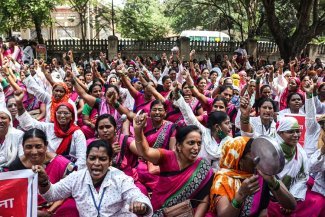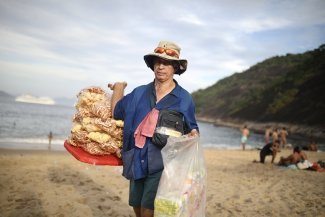
The results of the tawjihi — General Secondary Education Certificate Examination — were recently announced across the Palestinian territories to great cheers and celebration in some households and deep disappointment in others.
Palestinians see education as a vital asset to their development both as individuals and as a society under occupation.
The next step for those who excelled in the tawjihi is to find a place at university. Medicine and engineering continue to be the most sought-after studies for those with a score of 90 per cent or higher.
However, hope that a university education will help Palestinians secure a job and go on to build a family is a pipe dream for most. “Hope” is the operative word here, and is a commodity that is in short supply for Palestinians, particularly the young.
The number of unemployed Palestinians totalled 361,000 in 2016, the Palestinian Central Bureau for Statistics said, rising from 21.7 per cent in 2007 to 26.9 per cent in 2016.
The International Labour Organization (ILO) said the unemployment rate for Palestinian youth has reached 40 per cent. The unemployment rate in Gaza is more than 40 per cent and youth unemployment is more than 60 per cent and 85 per cent amongst young women. Gaza, of course, has suffered from a 10-year siege that has exacerbated the situation. The unemployment rate among men in East Jerusalem is reported to be 12.3 per cent and 26.8 per cent amongst women.
Palestinians recently marked Israel’s 50-year occupation of East Jerusalem, which means anyone born after 1967 has grown up under Israeli military rule.
The occupation has not been a static affair. Israel annexed East Jerusalem shortly after its occupation, claiming it as its united eternal capital. It has also actively pursued the construction of illegal settlements in the Palestinian areas, for Jews only, in a deliberate attempt to change its demographic makeup or, as the Palestinians see it, to Judaise it.
Some 300,000 Palestinians live in East Jerusalem. Their official status is “resident.” They are neither Israeli citizens nor holders of a Palestinian Authority passport. In 2014, the Israeli Ministry of Interior revoked the permanent residency status of 107 Palestinian residents of Jerusalem, including 56 women and 12 minors. Since 1967, the residency status of 14,416 Palestinian residents of Jerusalem has been revoked. In practice, this prevents them from returning to live in their place of birth.
In 2012, the Association for Civil Rights in Israel (ACRI) reported that 78 per cent of Palestinians, including 84 per cent of children, in the district of Jerusalem live below the poverty line. There are no official statistics collected by Israel as to the rate of unemployment among Palestinians. However, the Statistical Yearbook of Jerusalem, put out by the Jerusalem Institute for Israel Studies, said 40 per cent of males and 85 per cent of females do not participate in the workforce.
Only 41 per cent of Palestinian children are enrolled in municipal schools. There is a shortage of 1,000 classrooms in the official municipal education system; 194 classrooms were added in these schools from 2009-14 and an additional 211 are planned. More than 40 per cent of classrooms in the official municipal system are considered inadequate.
A particularly important statistic is that of school dropout rate. This stands at 26 per cent in 11th grade and 33 per cent in 12th grade; the national average stands at just a few percent. Those who drop out face a bleak future in terms of employment. Opportunities for employment are extremely limited. The jobs that do exist are low-pay and in many cases short-term.
Where youngsters hope to join a family business, particularly in the old city, they see a short, strained attempt by Israel to force them out of business through excessive taxation and other demands.
Many end up working part-time for low wages inside Israel with little hope of saving for a house, rent or to start a family. This forces many to continue living with their parents, resulting in overcrowded conditions.
Even if Palestinian families own land and have the means to extend their homes to accommodate offspring, Israel generally denies building permits. Such permits are not denied for their Jewish neighbours. As a result, some Palestinians end up working in the West Bank, putting their residency status in Jerusalem at risk.
The occupation also affects their lives by subjecting young Palestinians to regular arrests, sometimes for being suspected of throwing stones or being involved in carrying out what they see as acts of resistance. Cases of young Palestinians being mistreated in custody, such as being asked to sign confessions in Hebrew, which they do not speak, are well documented.
Young Palestinians have expressed a general sense of humiliation and do not see their status quo changing for years to come.








